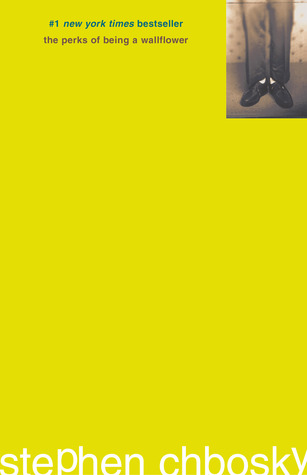 So, I had this book picked out to fulfill a "banned book" category for my reading challenge, but ended up swapping it for "a book that takes place in your home state," which is obviously Pennsylvania for me, after another title for that category didn't work out. But man oh man, after reading this, I can see why it was banned from so many schools and libraries. It is basically the sum of absolutely everything overprotective parents are afraid of their kids reading: sex, drugs, drinking, homosexuality, swearing...the whole deal. For the things like drugs and drinking, I don't think the book glorifies them; in the case of smoking and LSD, Chbosky actually puts out there multiple times how bad they can be. But for the other things, they aren't "glorified," but they're also not pushed into a corner and ignored as if they never existed. They just are, which is fine because these things do happen in teenager's lives. Should it have been banned? No. But I can see why the bands of people who focus on banning books zeroed in on this one.
So, I had this book picked out to fulfill a "banned book" category for my reading challenge, but ended up swapping it for "a book that takes place in your home state," which is obviously Pennsylvania for me, after another title for that category didn't work out. But man oh man, after reading this, I can see why it was banned from so many schools and libraries. It is basically the sum of absolutely everything overprotective parents are afraid of their kids reading: sex, drugs, drinking, homosexuality, swearing...the whole deal. For the things like drugs and drinking, I don't think the book glorifies them; in the case of smoking and LSD, Chbosky actually puts out there multiple times how bad they can be. But for the other things, they aren't "glorified," but they're also not pushed into a corner and ignored as if they never existed. They just are, which is fine because these things do happen in teenager's lives. Should it have been banned? No. But I can see why the bands of people who focus on banning books zeroed in on this one.Now, for the book itself... It's written like a series of letters from the main character and narrator, Charlie, to some anonymous reader. Charlie basically uses the letters as a way to "diary" his first year in high school. He's a quiet, withdrawn kid; one of his teachers points out that Charlie isn't really participating in life, but is more just observing it. In an attempt to change this, Charlie makes a real effort to start participating, and ends up becoming friends with two seniors, stepsiblings Sam and Patrick. He has a huge crush on Sam, which she tells him not to do, and he tries very hard to do so, but it still ends up shaping a lot of the book for him. The main "body" of the book is really just the day-to-day-ness of Charlie coming to terms with coming of age, in a way, and eventually learning to let go of things that have happened in the past and of his friends as they leave for college and their futures, though they remain friends. It's also a real medley of literary and pop-culture references, from To Kill a Mockingbird to The Rocky Horror Picture Show. I'm not a huge fan of the letter format, nor am I a big fan of first-person perspectives, but the book was okay, I guess. I think if I were still a teenager or going through some difficult time in college it might have resonated more. But I also apparently had a very sheltered adolescence, because even though Charlie never gets in trouble he was in way more "trouble" than I was ever even aware of, all things considered. But at the same time, I don't think I was sitting back and observing instead of participating, and that kind of does present a skewed view in this book: that in order to "participate," you have to do the things that Charlie ends up doing, and that's not actually the case. He and his friends spent most of the book behaving in ways that were, frankly, stupid, which makes the cult status of this book a little worrying to me.
And then, just briefly, let's talk about the end. I'll be honest: I hit the end of the book going, "What just happened?" and had to look it up on Wikipedia because it was left so vague. It both does and doesn't make sense to me. First, in the way that it does: Charlie was obviously suppressing things, to a very high degree, and to such a high degree that, even once it all came to light, he still doesn't want to write it down or have to think about it too much. But at the same time, it didn't make sense because Chbosky had Charlie just come out and talk about so many other things that most people would approach with a greater degree of delicacy, or dance around more, and then suddenly this was the thing that was left in the dark. You know, the thing that had been affecting Charlie for apparently the whole book? It just seems strange, and even going back and re-reading the "reveal" sections after I had looked up what exactly had happened, it was still very vague. I had more a sense of "yeah, I guess I can see that," than of "oh wow, how did I miss that?"
Basically, I think this book has its place, but I definitely wasn't it--and I think the body of the book has a lot more to offer than the ending, left foggy as it is, does.
2.5 stars out of 5.
No comments:
Post a Comment